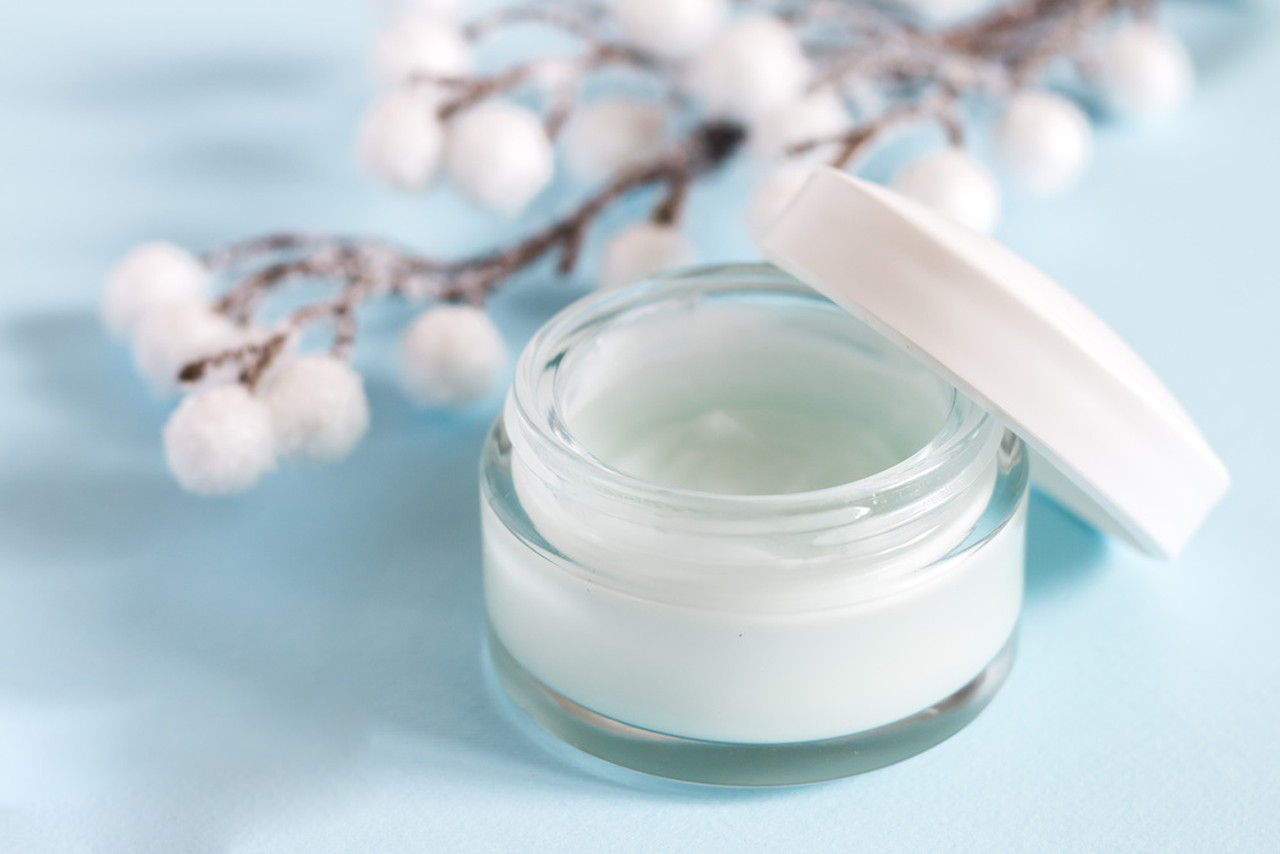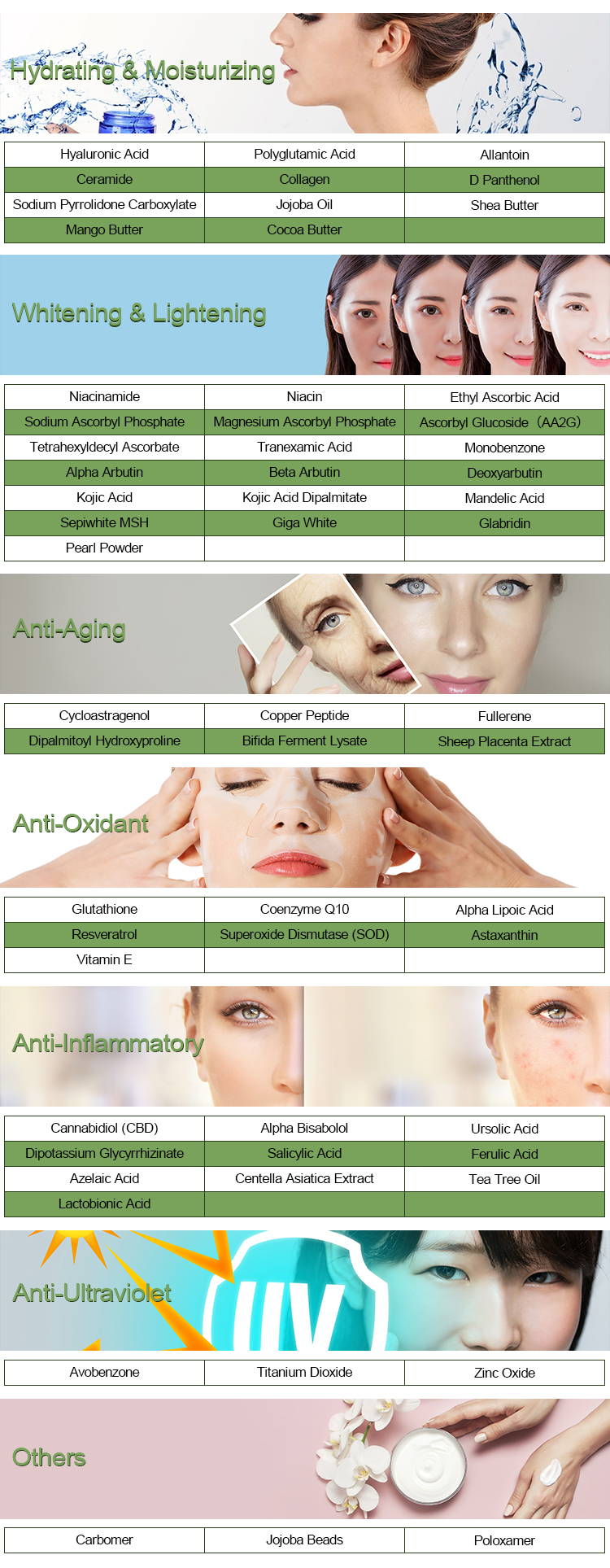D-Panthenol, also known as provitamin B5 or dexpanthenol, is a commonly used ingredient in cosmetics and skincare products due to its beneficial properties for the skin and hair. It is derived from vitamin B5 and is water-soluble. D-Panthenol is often added to formulations such as creams, lotions, shampoos, conditioners, and serums. Here’s an overview of its role in cosmetics:

1. Moisturizing and Hydration:
D-Panthenol is a humectant, which means it attracts and holds moisture from the environment, helping to keep the skin and hair hydrated. This helps to prevent dryness and maintain a healthy moisture balance. In skincare products, D-Panthenol can provide a soothing and moisturizing effect on the skin, making it suitable for products targeting dry or sensitive skin.
2. Skin Barrier Support:
D-Panthenol can improve the skin’s barrier function by enhancing its ability to retain moisture. A strong skin barrier helps to protect against external factors such as pollution, UV radiation, and harsh weather conditions. By reinforcing the skin’s barrier, D-Panthenol contributes to healthier and more resilient skin.
3. Anti-Inflammatory and Soothing Properties:
D-Panthenol has anti-inflammatory properties that can help calm and soothe irritated or inflamed skin. It is often included in products aimed at reducing redness, itching, and discomfort caused by various skin issues, including sunburns and minor irritations.
4. Wound Healing and Skin Regeneration:
D-Panthenol is known for its wound healing and regenerative properties. It can support the healing process by promoting the growth of new skin cells and aiding in the repair of damaged tissue. This makes it useful in products for promoting healing after minor cuts, burns, or other skin injuries.
5. Hair Care Benefits:
In hair care products, D-Panthenol can help improve the texture and appearance of hair. It can penetrate the hair shaft, providing hydration and strengthening to hair strands. This can lead to smoother, shinier, and more manageable hair. D-Panthenol is often found in shampoos, conditioners, and leave-in treatments.
6. Compatibility:
D-Panthenol is generally well-tolerated by most skin types and is considered non-irritating. It can be incorporated into a wide range of formulations without causing compatibility issues.
Overall, D-Panthenol is a versatile ingredient in cosmetics and skincare products due to its moisturizing, soothing, and regenerative properties. It can contribute to healthier-looking skin and hair by addressing various concerns such as dryness, irritation, and damage. As with any cosmetic ingredient, it’s important to consider individual sensitivities and perform patch tests if you’re trying out new products containing D-Panthenol.

Effects of D-Panthenol on skin
D-Panthenol, also known as provitamin B5 or dexpanthenol, is a derivative of vitamin B5 (pantothenic acid). It is commonly used in skincare and cosmetic products due to its beneficial effects on the skin. Here are some of the potential effects of D-Panthenol on the skin:
Moisturization: D-Panthenol is hygroscopic, which means it has the ability to attract and hold water molecules. When applied topically, it can help improve the skin’s hydration by trapping moisture and preventing water loss, leading to smoother and more hydrated skin.
Skin Barrier Function: D-Panthenol is known to support the skin’s natural barrier function. It can help strengthen the skin’s outermost layer, known as the stratum corneum, which is responsible for protecting the skin from external factors like pollutants, irritants, and pathogens.
Anti-Inflammatory: D-Panthenol has anti-inflammatory properties that can help soothe and calm irritated or inflamed skin. It can be particularly beneficial for those with sensitive or redness-prone skin, as it may help reduce redness and discomfort.
Wound Healing: D-Panthenol has been shown to promote wound healing by stimulating the production of new cells and accelerating the regeneration of damaged skin. It can help improve the healing process of minor cuts, scrapes, and burns.
Anti-Aging: Regular use of products containing D-Panthenol may contribute to a more youthful appearance by maintaining the skin’s hydration and barrier function. Well-hydrated skin tends to appear plumper and more elastic, which can help minimize the appearance of fine lines and wrinkles.

Skin Softening: D-Panthenol can make the skin feel softer and smoother due to its moisturizing properties. It can help reduce roughness and dryness, leaving the skin with a more supple texture.
Improvement of Skin Conditions: D-Panthenol has been used in products aimed at treating various skin conditions, such as eczema, dermatitis, and psoriasis. Its moisturizing and anti-inflammatory properties can provide relief for individuals with these conditions.
Enhanced Penetration of Other Ingredients: D-Panthenol’s ability to improve the skin’s barrier function can also aid in the absorption of other beneficial ingredients present in skincare products, allowing them to penetrate deeper into the skin and provide enhanced benefits.
Overall, D-Panthenol is a versatile ingredient in skincare products that can help improve skin hydration, barrier function, and overall appearance. However, individual responses to skincare ingredients can vary, so it’s a good idea to perform a patch test before incorporating products containing D-Panthenol into your skincare routine, especially if you have sensitive or reactive skin.
